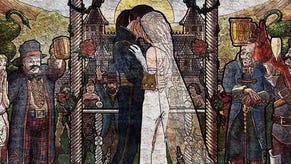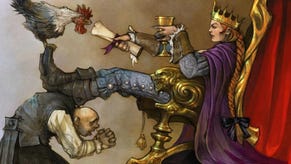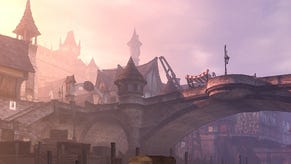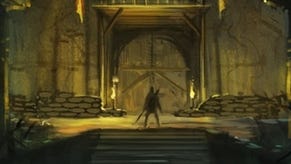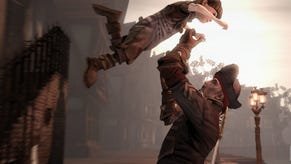Fable III
Dark days in Albion.
"Fable III is inspired more by the world described by Charles Dickens. It's just on the edge of the industrial revolution, and like the storytelling at the time, things got darker - you look at works like Oliver Twist and Great Expectations and they're really dark.
"We actually love that world," Molyneux continues. "In that darkness there's a lot more opportunity for humour and more potential for drama and telling a story which sits firmly in the memory."
The early stages of the game see your character waking up as a pampered prince, blissfully unaware of the turmoil beyond the palace gates. You're then forced to run for your life after falling out of favour with the king.
The brief window ahead of the prince's ex-communication is a masterclass in storytelling and game design. In quick succession, the game introduces the character of Jasper (voiced by John Cleese), your loyal butler; Elise, your childhood sweetheart; and Sir Walter (voiced by Bernard Hill), your mentor and combat trainer. Each of these three characters then take the player through a bare bones tutorial.
Jasper shows you how to change your appearance. Elise introduces you to the touch mechanic – in this instance, hand-holding. Sir Walter takes you through the game's combat system - press X to hit, hold the same button to block and hold it while moving the stick in the direction of your target for a massive swipe. (That's your lot until you get magic and a gun, which are mapped to the B and Y buttons).
It's also at this stage you're faced with your first duel with morality. The choice is very simplistic: either act like a sugary goodie-two-shoes or a pantomime villain. But the next decision pulls the rug right out from under you, as you're forced to make a decision that pushes the needle on that moral compass into decidedly grey territory. It's a no win situation with no clear cut right or wrong answer.
It's also an important indication that Fable III's darker and slightly more modern setting has allowed the team at Lionhead to expand on the Fable franchise's other key aspect, moral choice. This both adds a new dimension in the game's moral choice gameplay, and, as Molyneux is keen to stress, keeps the mechanic feeling fresh throughout.
"The choice between good and evil, for most players, isn't much of a choice at all," says Molyneux. "They want to be good. That mechanic of giving you choices kind of lost its power really. If 90 per cent of the players decide to be good, it's not very dramatic."
Making the player king of Albion seems like the most logical progression for the Fable franchise. It's also a way to lend depth to the game's moral choices, which in turn distance Fable III from a the huge number of titles featuring the same mechanic.
"We needed was a way to make the moral choices have power," says Molyneux. "The choices you make on the way to becoming a ruler and the choices you make as king give the moral choice mechanic some gravitas.
